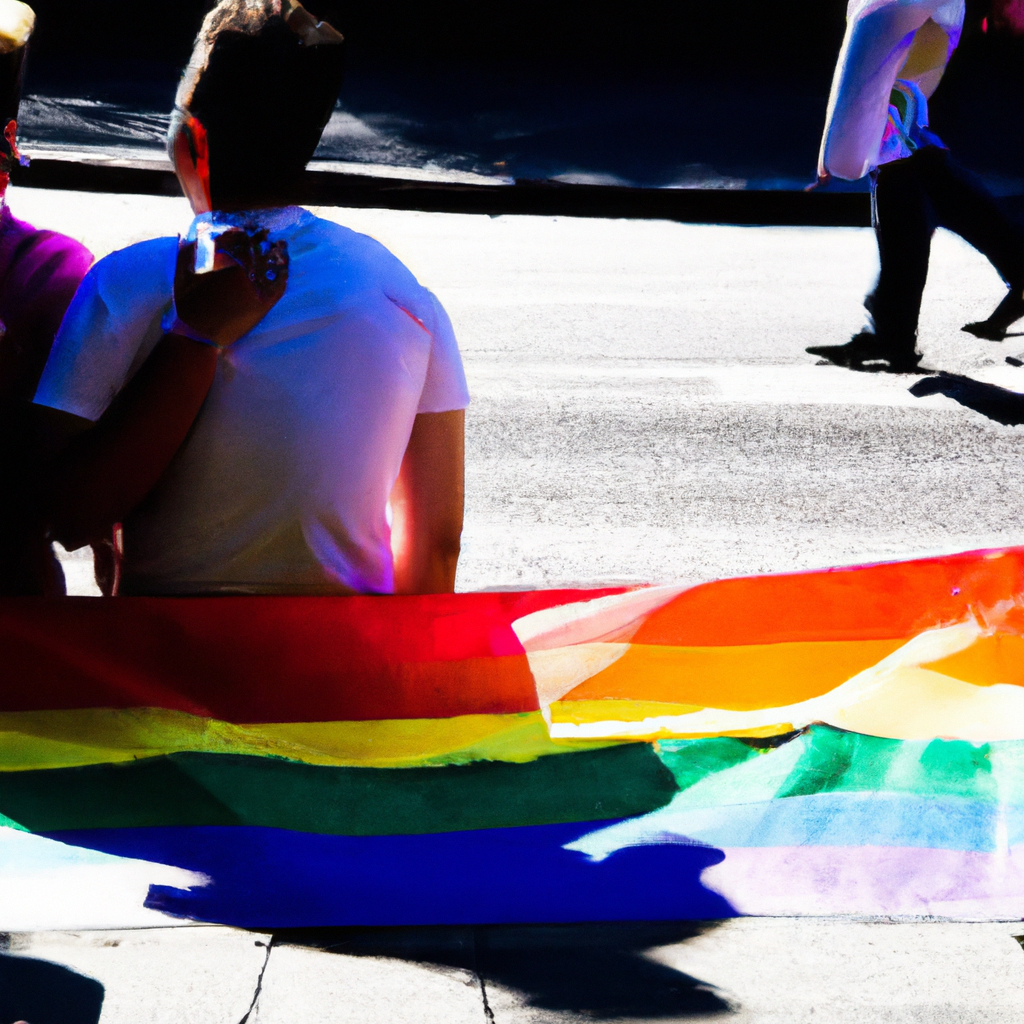
In search of an LGBTQ+-friendly marriage counselor or therapist? It’s important to find someone who not only understands but also supports your unique needs and experiences as part of the LGBTQ+ community. This article explores different strategies for finding the right professional, from seeking referrals within the community to utilizing specialized online directories. Additionally, we’ll delve into the question of whether there are workshops or retreats specifically designed to strengthen gay marriages. Getting the right support is crucial, and this article aims to help you navigate the path to finding a compassionate and understanding professional for your relationship needs.

Understanding the Importance of LGBTQ+-Friendly Marriage Counselors and Therapists
Recognizing the need for LGBTQ+-inclusive therapy
Finding a marriage counselor or therapist who is knowledgeable and sensitive to LGBTQ+ issues is crucial for ensuring that you receive the support and guidance you need. LGBTQ+ individuals and couples face unique challenges and experiences that can greatly benefit from a counselor who understands and affirms their identities. By recognizing the need for LGBTQ+-inclusive therapy, you are taking an important step towards fostering a healthy and thriving relationship.
The benefits of LGBTQ+-friendly marriage counseling
Choosing an LGBTQ+-friendly marriage counselor or therapist can provide numerous benefits to you and your partner. These professionals have a deep understanding of LGBTQ+ issues and have received training on effectively addressing the concerns and struggles faced by LGBTQ+ individuals and couples. With their support, you can navigate specific challenges such as coming out, dealing with discrimination, or managing conflicts related to gender and sexual identity. LGBTQ+-friendly marriage counseling creates a safe and inclusive space where you can openly express yourself, promote personal growth, and strengthen your relationship.
Addressing unique challenges faced by LGBTQ+ couples
LGBTQ+ couples often encounter unique challenges that may not be present in heterosexual relationships. These challenges can arise from internalized homophobia or transphobia, external stigma and discrimination, communication and trust issues, family and societal pressures, and conflicts related to gender and sexual identity. LGBTQ+-friendly marriage counselors and therapists are equipped with the knowledge and skills to help you navigate and overcome these obstacles in a supportive and affirming way. Through their expertise, you can develop coping strategies, improve communication, build a stronger bond, and foster a healthier and more fulfilling relationship.
Finding LGBTQ+-Friendly Marriage Counselors and Therapists
Seek recommendations from LGBTQ+ community organizations
One of the most effective ways to find LGBTQ+-friendly marriage counselors and therapists is by seeking recommendations from LGBTQ+ community organizations. These organizations often have networks of professionals who specialize in providing inclusive and affirming therapy to the LGBTQ+ community. They can offer valuable suggestions based on their experiences with different counselors and therapists, ensuring that you find someone who meets your specific needs.
Contact LGBTQ+ support groups and online forums
Another great resource for finding LGBTQ+-friendly marriage counselors and therapists is through LGBTQ+ support groups and online forums. These platforms provide a space for LGBTQ+ individuals and couples to share their experiences and seek advice from others who have faced similar challenges. By reaching out to these communities, you can ask for recommendations and gather personal insights about therapists who have proven to be LGBTQ+ inclusive and understanding.
Utilize online directories for LGBTQ+-friendly therapists
Online directories specifically tailored for LGBTQ+ individuals and couples can also be a valuable tool when searching for an LGBTQ+-friendly marriage counselor or therapist. Websites like Psychology Today, TherapyDen, and Gaylesta offer filters that allow you to search for therapists who specialize in LGBTQ+ issues and affirming practices. These directories often provide detailed profiles and information about therapists’ areas of expertise, ensuring that you can make an informed decision when selecting a counselor.
Conduct research on therapy websites and directories
General therapy websites and directories can also be a useful resource for finding LGBTQ+-friendly marriage counselors and therapists. Many therapists include information on their websites about their experience and approach to working with LGBTQ+ individuals and couples. By thoroughly researching therapist profiles and reading about their qualifications and specialties, you can identify professionals who are knowledgeable and sensitive to LGBTQ+ issues.
Consider specialized LGBTQ+ therapy organizations
There are organizations dedicated to providing LGBTQ+-friendly counseling and therapy services. These organizations, such as the GLMA – Health Professionals Advancing LGBTQ Equality and the Association for Gay, Lesbian, Bisexual & Transgender Issues in Counseling, have directories of professionals who are specifically trained in LGBTQ+ issues. Considering these specialized LGBTQ+ therapy organizations can greatly increase the chances of finding a marriage counselor or therapist who is not only LGBTQ+-friendly but also well-versed in the unique challenges faced by the LGBTQ+ community.
Evaluating Potential LGBTQ+-Friendly Marriage Counselors and Therapists
Review therapist profiles and credentials
When evaluating potential LGBTQ+-friendly marriage counselors and therapists, it is important to review their profiles and credentials. Look for information about their education and qualifications, including whether they have received specialized training in LGBTQ+ issues. Additionally, take note of any certifications or memberships in professional organizations related to LGBTQ+ therapy or counseling.
Explore their experience and expertise in LGBTQ+ issues
Understanding the therapist’s experience and expertise in LGBTQ+ issues is crucial to finding someone who can effectively support you and your partner. Consider the number of years they have been working with LGBTQ+ individuals and couples, as well as any specific areas of focus they may have. Look for indications that they have received training on LGBTQ+ issues or participated in workshops or conferences related to LGBTQ+ therapy.
Assess their approach to marriage counseling and therapy
It is essential to assess the therapist’s approach to marriage counseling and therapy to ensure it aligns with your needs and values. Some therapists may take a more traditional approach, while others may use more contemporary or LGBTQ+-specific techniques. During your evaluation, consider the therapeutic modalities they employ, such as cognitive-behavioral therapy, emotion-focused therapy, or narrative therapy, and determine if they resonate with you and your partner.
Consider their knowledge on specific LGBTQ+ issues
In addition to understanding LGBTQ+ issues broadly, it is important to consider the therapist’s knowledge on specific concerns or challenges that you and your partner may be facing. This could include topics such as transgender issues, non-binary identities, same-sex parenting, or LGBTQ+ cultural nuances. Assessing the therapist’s familiarity with these specific issues will help ensure that they can provide you with the support and guidance that is tailored to your needs.
Evaluate their level of cultural competence and sensitivity
Cultural competence and sensitivity are vital aspects of an LGBTQ+-friendly marriage counselor or therapist. Consider whether the therapist demonstrates an understanding of the unique experiences, struggles, and strengths of the LGBTQ+ community. Assess whether they use inclusive language, affirm your identities, and create a safe and nonjudgmental environment where you feel comfortable expressing yourselves.
Factors to Consider in LGBTQ+-Friendly Marriage Counseling
Privacy and confidentiality
Privacy and confidentiality are paramount in any therapeutic relationship, especially for LGBTQ+ individuals and couples who may face additional risks concerning their identity disclosure. Make sure to discuss confidentiality policies and ensure that the therapist has a clear understanding of the importance of maintaining privacy and protecting your identities.
Accessibility and location
Consider the accessibility and location of the therapist’s office. Find out if they offer remote or online sessions if traveling to their office poses a challenge. It is essential to select a therapist who is easily accessible to you and your partner to ensure consistent attendance and ease of scheduling.
Cost and insurance coverage
Evaluate the cost of therapy sessions and inquire about insurance coverage or any sliding scale options available. While it is crucial to find an LGBTQ+-friendly marriage counselor or therapist, it is also essential to consider your financial situation and ensure that the therapy remains financially sustainable.
Availability and scheduling
Consider the therapist’s availability and whether their schedule aligns with yours and your partner’s. Finding a therapist who can accommodate your preferred days and times will contribute to the success of your therapy journey.
Cultural and gender identity competence
Ensure that the therapist demonstrates cultural and gender identity competence. This means that they respect and affirm diverse identities and will adapt their therapeutic approach to recognize and address the unique experiences and challenges faced by individuals and couples within the LGBTQ+ community.

Preparing for LGBTQ+-Friendly Marriage Counseling
Outline your goals and expectations
Prior to starting LGBTQ+-friendly marriage counseling, it is helpful to outline your goals and expectations as individuals and as a couple. Reflect on what you hope to achieve through therapy and discuss these goals with your partner. By having a clear vision of what you want to gain from the counseling process, you can better communicate your needs to the therapist.
Discuss potential concerns or fears
Openly discussing any concerns or fears you may have about marriage counseling is crucial. Express your worries about being understood, validated, or judged. It is normal to have reservations, and addressing them in advance can help create a space for the therapist to address and alleviate your concerns.
Reflect on your relationship dynamics and challenges
Take some time to reflect on your relationship dynamics and identify the specific challenges you and your partner are facing. This self-reflection can help you articulate your concerns and express your needs more effectively during counseling sessions. It can also provide the therapist with valuable insights into your relationship dynamics.
Consider individual and couple’s therapy options
In addition to seeking marriage counseling, consider whether individual or couple’s therapy may also be beneficial. Individual therapy can provide a space for exploring personal experiences and addressing individual struggles, while couple’s therapy focuses on the dynamics and challenges within the relationship. Discuss these options with your partner and consider whether incorporating them into your therapy journey would be helpful.
Understand the commitment and effort required
It is crucial to understand that LGBTQ+-friendly marriage counseling requires commitment and effort from both you and your partner. Therapy is not a quick fix but rather a journey that requires active participation, openness, and willingness to explore and grow. Recognizing this commitment beforehand will help you approach therapy with the right mindset and set realistic expectations.
Navigating Challenges in LGBTQ+-Friendly Marriage Counseling
Overcoming internalized homophobia or transphobia
Internalized homophobia or transphobia can present significant challenges within LGBTQ+ relationships. These internalized biases are shaped by societal stigma and can impact self-image, self-esteem, and relationship dynamics. In therapy, you and your partner can work with the counselor to challenge and overcome these negative beliefs, fostering self-acceptance and creating healthier relationship dynamics.
Addressing external stigma and discrimination
LGBTQ+ individuals and couples often face external stigma and discrimination from society or family members. These external factors can significantly impact relationships and mental well-being. A LGBTQ+-friendly therapist can offer guidance on coping strategies, assertiveness skills, and developing resilience in the face of external challenges.
Working through communication and trust issues
Like any couple, LGBTQ+ partners may encounter communication and trust issues. These challenges can be compounded by the impact of societal biases. A skilled marriage counselor or therapist can help you and your partner improve your communication skills, build trust, and develop strategies for navigating difficult conversations, ultimately enhancing your connection and understanding.
Coping with family and societal pressures
Family and societal pressures can be particularly pertinent in LGBTQ+ relationships. Navigating these pressures, whether they stem from non-accepting family members or prejudiced societal norms, can be emotionally taxing. An LGBTQ+-friendly therapist can provide guidance on setting boundaries, finding support systems, and developing coping mechanisms to navigate these complex dynamics.
Managing conflicts related to gender and sexual identity
Conflicts may arise within LGBTQ+ relationships related to gender identity, sexual orientation, or the process of coming out. These conflicts can create tension and strain the relationship. A therapist who understands and affirms LGBTQ+ experiences can help you and your partner address and resolve these conflicts by fostering open and respectful dialogue and creating a safe space for exploration and understanding.
Alternatives and Supplementary Resources for LGBTQ+ Couples
Attending LGBTQ+-inclusive workshops or retreats
Attending LGBTQ+-inclusive workshops or retreats catered to strengthening gay marriages and relationships can be an excellent supplement to marriage counseling. These events provide an opportunity to learn from experts, engage with other LGBTQ+ couples facing similar challenges, and acquire practical skills and tools to enhance your relationship.
Participating in LGBTQ+ relationship support groups
LGBTQ+ relationship support groups offer a safe and supportive space for couples to connect, share experiences, and gain insights from others navigating similar relationship dynamics. These groups can be found online or within local LGBTQ+ community centers.
Exploring online resources and self-help materials
The internet offers a wealth of online resources and self-help materials specifically tailored for LGBTQ+ couples. From articles and blogs to targeted workbooks and exercises, these resources provide guidance on various relationship topics, including communication, conflict resolution, and maintaining intimacy.
Considering LGBTQ+ affirming books and podcasts
Books and podcasts that focus on LGBTQ+ relationships, identity exploration, and personal growth can offer valuable insights and perspectives. Whether you prefer reading or listening, these resources can provide inspiration and guidance as you navigate your journey as an LGBTQ+ couple.
Seeking additional professional advice or support
Should you feel the need for additional professional advice or support outside of marriage counseling, consider seeking couples coaching, sex therapy, or individual therapy to address specific concerns or challenges. These additional resources can complement your marriage counseling efforts and provide a more comprehensive approach to your overall well-being and relationship satisfaction.
Promoting LGBTQ+-Friendly Counseling and Therapy Services
Advocating for inclusive practices in the mental health field
As individuals and couples benefitting from LGBTQ+-friendly counseling and therapy services, advocating for inclusive practices within the mental health field is crucial. Encourage therapists to pursue ongoing training and education in LGBTQ+ issues, and express your positive experiences to help promote a culture of inclusivity and understanding within the therapeutic community.
Supporting organizations and initiatives promoting LGBTQ+ inclusivity
Supporting organizations and initiatives that work towards LGBTQ+ inclusivity in the mental health field is another way to make a positive impact. Organizations such as the Trevor Project, GLAAD, and Human Rights Campaign focus on promoting acceptance, understanding, and equal access to mental health services for the LGBTQ+ community.
Sharing positive experiences and recommendations
Sharing your positive experiences and recommendations about LGBTQ+-friendly marriage counselors and therapists can be immensely helpful to others searching for support. Leave reviews or testimonials on online directories, LGBTQ+ community forums, or therapist websites, highlighting the affirming and inclusive care you received.
Raising awareness among LGBTQ+ individuals and couples
Raising awareness among LGBTQ+ individuals and couples about the importance of LGBTQ+-friendly counseling and therapy services is essential. Utilize social media platforms, participate in local LGBTQ+ events, or share resources within your community to ensure that others have access to supportive therapeutic spaces.
Demanding diversity and inclusivity in therapeutic spaces
Demanding diversity and inclusivity in therapeutic spaces is crucial for creating a more equitable and affirming mental health field. Advocate for diverse representation within professional organizations, call for LGBTQ+-inclusive curriculums in therapist training programs, and promote policy changes that prioritize the needs of LGBTQ+ individuals and couples.
In conclusion, finding an LGBTQ+-friendly marriage counselor or therapist requires careful consideration, research, and evaluation. By actively seeking inclusive professionals, preparing for therapy, and addressing challenges unique to LGBTQ+ couples, you can foster a healthier and more fulfilling relationship. Together, we can promote LGBTQ+-friendly counseling and therapy services, ensuring that everyone can access the support they need to thrive.




